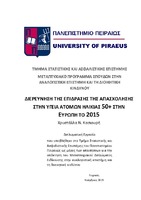Διερεύνηση της επίδρασης της απασχόλησης στην υγεία ατόμων ηλικίας 50+ στην Ευρώπη το 2015
Assessing the effects of occupation on the health of persons aged 50+ in Europe in 2015

Προβολή/
Λέξεις κλειδιά
Απασχόληση ; Ανεργία ; Υγεία ; Νοσηρότητα ; Περιγραφική στατιστική ; Οικονομετρικά υποδείγματα ; Λογιστική παλινδρόμησηΠερίληψη
Η απασχόληση, και κατά συνέπεια η ανεργία, αποτελεί ένα από τα σημαντικότερα θέματα στη σύγχρονη εποχή. Η παρούσα διπλωματική εργασία έχει σκοπό τη διερεύνηση της επίδρασης της απασχόλησης στην υγεία ατόμων ηλικίας 50+ στην Ευρώπη το 2015. Για την επίτευξη του σκοπού της μελέτης χρησιμοποιήθηκαν δεδομένα από το έκτο κύμα της έρευνας SHARE και ως μέθοδος ανάλυσης η λογιστική παλινδρόμηση. Συγκεκριμένα, στο πρώτο κεφάλαιο αναλύονται βασικές έννοιες της απασχόλησης και της ανεργίας, καθώς τα επίπεδα και οι διαφοροποιήσεις τους κατά πληθυσμιακές ομάδες. Επίσης, αναφέρονται οι επιπτώσεις τους στην ψυχική υγεία του ατόμου και πώς επηρεάζουν την κοινωνία. Στο δεύτερο κεφάλαιο δίνονται πληροφορίες σχετικά με τη δομή και τα χαρακτηριστικά της έρευνας SHARE και παρουσιάζονται αναλυτικά οι μεταβλητές που έχουν χρησιμοποιηθεί στην ανάλυση. Στη συνέχεια, ακολουθεί μια πρώτη περιγραφική προσέγγιση των στοιχείων του δείγματος, για τη διερεύνηση διαφοροποιήσεων σε επίπεδα απασχόλησης και ανεργίας σε σχέση με δημογραφικά, κοινωνικο-οικονομικά χαρακτηριστικά, καθώς και με σχετικές ασθένειες. Στο τρίτο κεφάλαιο, περιγράφεται η μέθοδος της λογιστικής παλινδρόμησης και επεξηγούνται οι συνηθέστεροι τρόποι που ελέγχεται η ολική επάρκεια ενός μοντέλου. Επιπρόσθετα, περιλαμβάνεται η ανάπτυξη μοντέλων λογιστικής παλινδρόμησης και αποτυπώνονται ερμηνείες που οδηγούν στην πιθανή συσχέτιση μεταξύ ορισμένων ασθενειών (εξαρτημένες μεταβλητές) και άλλων ανεξάρτητων μεταβλητών (δημογραφικές, κοινωνικο-οικονομικές, επικίνδυνες συμπεριφορές, απασχόληση και χαρακτηριστικά της). Τέλος, στο πέμπτο κεφάλαιο παρατίθενται τα κύρια συμπεράσματα της εργασίας που προέκυψαν από τη στατιστική ανάλυση. Πιο συγκεκριμένα, οι συνταξιούχοι φαίνεται να έχουν την χειρότερη υγεία στις μεταβλητές που εξετάσαμε ενώ οι άνεργοι είναι σε καλύτερη μοίρα από τους συνταξιούχους αλλά σε χειρότερη σε σχέση με τους εργαζόμενους. Από την άλλη, για τη μεταβλητή που εκφράζει την ψυχική υγεία του ατόμου και συγκεκριμένα την εμφάνιση κατάθλιψης, υψηλότερες πιθανότητες παρουσιάζουν οι άνεργοι και γενικότερα τα άτομα που δεν εργάζονται (άτομα με αναπηρίες ή μόνιμες ασθένειες και νοικοκυρές). Παράλληλα, πολύ σημαντικό ρόλο στην υγεία του ατόμου παίζει τόσο το είδος της εργασίας όσο και η ευχαρίστηση του ατόμου με την απασχόληση του. Φαίνεται λοιπόν, ότι τα άτομα που δεν είναι ικανοποιημένα με το επάγγελμά τους ή τα άτομα που εργάζονται σε πολύ απαιτητικά επαγγέλματα έχουν πολύ υψηλότερες πιθανότητες να εμφανίσουν νοσήματα σε σχέση τόσο με τη σωματική όσο και με την ψυχική τους υγεία.

